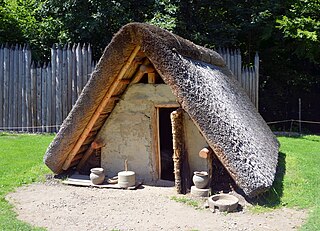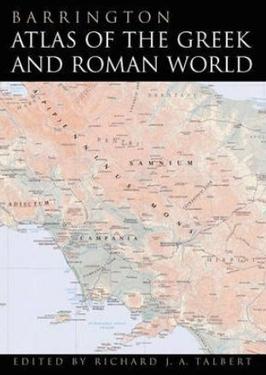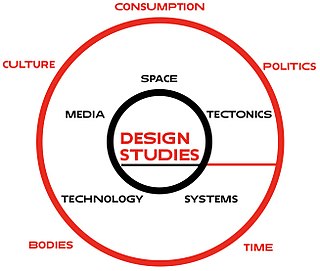
Anthropology is the scientific study of humanity, concerned with human behavior, human biology, cultures, societies, and linguistics, in both the present and past, including past human species. Social anthropology studies patterns of behavior, while cultural anthropology studies cultural meaning, including norms and values. A portmanteau term sociocultural anthropology is commonly used today. Linguistic anthropology studies how language influences social life. Biological or physical anthropology studies the biological development of humans.

Ethnography is a branch of anthropology and the systematic study of individual cultures. Ethnography explores cultural phenomena from the point of view of the subject of the study. Ethnography is also a type of social research that involves examining the behavior of the participants in a given social situation and understanding the group members' own interpretation of such behavior.

The Field Museum of Natural History (FMNH), also known as The Field Museum, is a natural history museum in Chicago, Illinois, and is one of the largest such museums in the world. The museum is popular for the size and quality of its educational and scientific programs, and its extensive scientific specimen and artifact collections. The permanent exhibitions, which attract up to 2 million visitors annually, include fossils, current cultures from around the world, and interactive programming demonstrating today's urgent conservation needs. The museum is named in honor of its first major benefactor, Marshall Field, the department-store magnate. The museum and its collections originated from the 1893 World's Columbian Exposition and the artifacts displayed at the fair.

George Peter ("Pete") Murdock, also known as G. P. Murdock, was an American anthropologist who was professor at Yale University and University of Pittsburgh. He is remembered for his empirical approach to ethnological studies and his study of family and kinship structures across differing cultures. His 1967 Ethnographic Atlas dataset on more than 1,200 pre-industrial societies is influential and frequently used in social science research. He is also known for his work as an FBI informant on his fellow anthropologists during McCarthyism.
The Human Relations Area Files, Inc. (HRAF), located in New Haven, Connecticut, US, is an international nonprofit membership organization with over 500 member institutions in more than 20 countries. A financially autonomous research agency based at Yale University since 1949, its mission is to promote understanding of cultural diversity and commonality in the past and present. To accomplish this mission, the Human Relations Area Files produces scholarly resources and infrastructure for research, teaching and learning, and supports and conducts original research on cross-cultural variation.
Cross-cultural studies, sometimes called holocultural studies or comparative studies, is a specialization in anthropology and sister sciences such as sociology, psychology, economics, political science that uses field data from many societies through comparative research to examine the scope of human behavior and test hypotheses about human behavior and culture.

A codebook is a type of document used for gathering and storing cryptography codes. Originally, codebooks were often literally books, but today "codebook" is a byword for the complete record of a series of codes, regardless of physical format.
Ethnoarchaeology is the ethnographic study of peoples for archaeological reasons, usually through the study of the material remains of a society. Ethnoarchaeology aids archaeologists in reconstructing ancient lifeways by studying the material and non-material traditions of modern societies. Ethnoarchaeology also aids in the understanding of the way an object was made and the purpose of what it is being used for. Archaeologists can then infer that ancient societies used the same techniques as their modern counterparts given a similar set of environmental circumstances.
In genealogy, the progenitor is the – sometimes legendary – founder of a family, line of descent, clan or tribe, noble house, or ethnic group. Genealogy understands a progenitor to be the earliest recorded ancestor of a consanguineous family group of descendants.

A pit-house is a house built in the ground and used for shelter. Besides providing shelter from the most extreme of weather conditions, these structures may also be used to store food and for cultural activities like the telling of stories, dancing, singing and celebrations. General dictionaries also describe a pit-house as a dugout, and it has similarities to a half-dugout.
Archaeological ethics refers to the moral issues raised through the study of the material past. It is a branch of the philosophy of archaeology. This article will touch on human remains, the preservation and laws protecting remains and cultural items, issues around the globe, as well as preservation and ethnoarchaeology.

The Barrington Atlas of the Greek and Roman World is a large-format English language atlas of ancient Europe, Asia, and North Africa, edited by Richard J. A. Talbert. The time period depicted is roughly from archaic Greek civilization through Late Antiquity. The atlas was published by Princeton University Press in 2000. The book was the winner of the 2000 Association of American Publishers Award for Best Professional/Scholarly Multivolume Reference Work in the Humanities.

Douglas R. White was an American complexity researcher, social anthropologist, sociologist, and social network researcher at the University of California, Irvine.
Phylogenetic autocorrelation also known as Galton's problem, after Sir Francis Galton who described it, is the problem of drawing inferences from cross-cultural data, due to the statistical phenomenon now called autocorrelation. The problem is now recognized as a general one that applies to all nonexperimental studies and to experimental design as well. It is most simply described as the problem of external dependencies in making statistical estimates when the elements sampled are not statistically independent. Asking two people in the same household whether they watch TV, for example, does not give you statistically independent answers. The sample size, n, for independent observations in this case is one, not two. Once proper adjustments are made that deal with external dependencies, then the axioms of probability theory concerning statistical independence will apply. These axioms are important for deriving measures of variance, for example, or tests of statistical significance.
The Standard Cross-Cultural Sample (SCCS) is a sample of 186 cultures used by scholars engaged in cross-cultural studies.
Research data archiving is the long-term storage of scholarly research data, including the natural sciences, social sciences, and life sciences. The various academic journals have differing policies regarding how much of their data and methods researchers are required to store in a public archive, and what is actually archived varies widely between different disciplines. Similarly, the major grant-giving institutions have varying attitudes towards public archival of data. In general, the tradition of science has been for publications to contain sufficient information to allow fellow researchers to replicate and therefore test the research. In recent years this approach has become increasingly strained as research in some areas depends on large datasets which cannot easily be replicated independently.
The following outline is provided as an overview of and topical guide to anthropology:
Computer-assistedqualitative data analysis software (CAQDAS) offers tools that assist with qualitative research such as transcription analysis, coding and text interpretation, recursive abstraction, content analysis, discourse analysis, grounded theory methodology, etc.

Design studies can refer to any design-oriented studies but is more formally an academic discipline or field of study that pursues, through both theoretical and practical modes of inquiry, a critical understanding of design practice and its effects in society.








